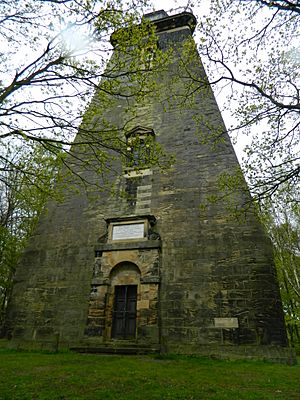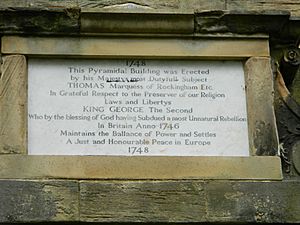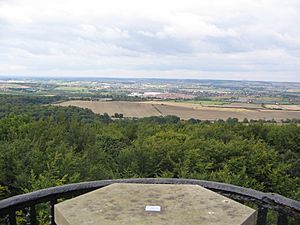Hoober Stand facts for kids
Quick facts for kids Hoober Stand |
|
|---|---|

Hoober Stand in 2015
|
|
| Type | Folly |
| Location | Wentworth |
| OS grid reference | SK 40747 98545 |
| Area | South Yorkshire |
| Built | 1748 |
| Architect | Henry Flitcroft |
|
Listed Building – Grade II
|
|
| Official name: Hoober Stand | |
| Designated | 29 April 1952 |
| Reference no. | 1132812 |
| Lua error in Module:Location_map at line 420: attempt to index field 'wikibase' (a nil value). | |
Hoober Stand is a 30-metre-high (98 ft) tower and a Grade II* listed building in Wentworth, South Yorkshire, northern England. It was designed by Henry Flitcroft for a powerful nobleman named Thomas Watson-Wentworth. He was the Earl of Malton and later became the 1st Marquess of Rockingham.
The tower was built to celebrate the end of the 1745 Jacobite rebellion, a time when some people tried to put a different king on the throne. Hoober Stand is near his large country home, Wentworth Woodhouse. From the top of the tower, which is about 157 metres (515 ft) above sea level, you can see far away on a clear day.
Hoober Stand is one of several special buildings called follies in the area. Other follies nearby include Needle's Eye and Keppel's Column. These buildings were often built just for decoration or to mark an event, not for a practical purpose.
History of Hoober Stand
Thomas Watson-Wentworth, who was the Earl of Malton, supported the British Government during the 1745 Jacobite uprising. When the rebellion was stopped, King George II rewarded the Earl. He made him the 1st Marquess of Rockingham.
Watson-Wentworth then asked the architect Henry Flitcroft to design a monument to remember this victory.
Building the tower took from 1746 to 1748 and cost £3,000. Above the main door, there is a special message carved into a stone plaque. It says that the building was put up by Thomas, Marquess of Rockingham. He built it to show his thanks to King George II, who had saved their religion, laws, and freedoms by stopping the rebellion in 1746. The message also says that the King helped bring peace to Europe in 1748.
Where is Hoober Stand?
Hoober Stand is on a high ridge, about 157 metres (515 ft) above sea level. It's in a countryside area near Rotherham, less than a mile from Wentworth village. You can drive to it along Lea Brook Lane, which is north of the tower. There's a car park right next to the monument.
What Does Hoober Stand Look Like?
The tower is about 30 meters (100 feet) tall. It has a unique shape: it's an equilateral triangle with rounded corners at the bottom. It's built from sandstone. The three walls go straight up for about 4.5 metres (15 ft). Then, they start to get narrower, leading up to a hexagonal (six-sided) top part called a cupola.
Around the cupola is a triangular viewing platform. You can reach this platform by climbing 150 steps on a spiral staircase inside the tower. People believe that the three walls under the cupola were meant to represent England (including Wales), Scotland, and Ireland, all united under one crown. The outside of the tower looks quite plain, but the inside has more decorations.
The staircase inside the tower gets light from five windows. There are also two windows in the cupola at the very top.
The wall with the entrance door faces south. As you walk around the tower, you might notice something interesting. The way the upper part of the walls tapers inwards can make it look like the tower is leaning or falling over. Also, the cupola at the top, even though it's in the middle, seems to move from side to side as you walk around the tower from different angles.
 | Chris Smalls |
 | Fred Hampton |
 | Ralph Abernathy |



